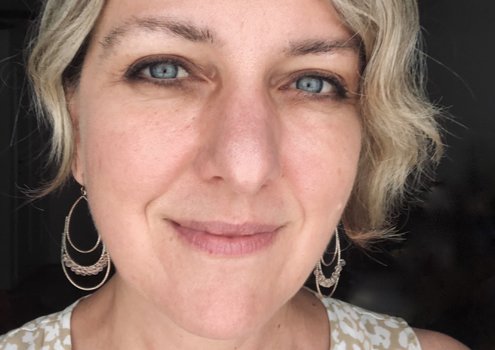Reading time: About 2 minutes
Christine Switzer says that when she doesn’t feel like writing, she refuses to try to persuade herself that she does….
Christine Swtizer is a poet whose work has recently been featured in Growing Toward the Light, an exhibit at All Saints Austin featuring art and poetry for Ordinary Time. And one of her poems serves as the epigraph for YA fantasy novel The Burning Tree by Helen Dent, released in September 2024. Christine hosts poetry writing intensives, creative cohorts for artists, and other workshops that support creatives in growing in their craft and sharing their stories. As a storyteller, she has recently contributed strategic storytelling to corporate clients that include Square and Mastercard. Her favorite ways to refuel as an artist is through time hiking, reading, and playing with her family.
I was excited to talk to Christine about how she approaches writing.
Q: Roughly how much time do you spend writing every day?
About two to three scattered hours. As a poet and storyteller, I’m rarely ever not writing. I may spend a half an hour early writing poetry, an hour after lunch with a client project, scattered moments writing articles and social posts, and a late window on a novel chapter.
Q. What’s a simple activity or habit that makes you a better writer?
Showing up to the blank page as often as possible, and putting that time on our family’s weekly schedule. I have to schedule writing time or it doesn’t happen. Giving myself a project or deadline also helps. For example, during December I’m hosting an Advent poetry writing intensive, and we’re writing poetry every day focused on the Advent season.
Q. What interferes with your writing?
Ha! What doesn’t interfere?!
Q. How do you persuade yourself to sit down to write on days when you really, really DON’T feel like doing it?
I don’t spend time or energy persuading myself. In this life season, I’m just too busy. I approach writing, even writing poetry, like caring for dishes or laundry. I accept that this is part of my day, and I seek to break it down in ways that make it manageable.
Q. Is there a particular motto or saying that you’ve found helpful for writing?
Once a pastor friend shared that sometimes he feels as spiritual as a head of cabbage. I’ve never forgotten that. Sometimes I feel as creative as a head of cabbage, and that’s okay. It doesn’t change me or my writing. And it’s definitely not a reason not to write.
Q. Which stage of the writing process do you enjoy the most: researching, writing or editing/rewriting and why?
I love any moment in the process when something clicks and magic happens. A plot idea works, a phrase carries the line in a poem, or a metaphor comes alive. And this can happen at any stage in the writing process. This is part of why I am a writer.
Q, What’s the best book you’ve read (either fiction or non) in the last five years?
The Ruthless Elimination of Hurry by John Mark Comer. This book is about spiritual disciplines in the Christian faith tradition. I found the book encouraging and helpful within this context but also as an artist submerged in an overbusy culture. Transformative really.
Q. What book are you reading right now?
Creativity: A Short and Cheerful Guide by John Cleese. I’ve been wanting to read this one for a few years and just picked it up this week to read and share with artists in my Creative Cohort for Artists.
Q. What do you think is the biggest misperception that new writers have about the act of writing?
That the everyday experience of a writer is like that of a writer in a movie. While the mountaintop moments are sweet, it’s most often the unremarkable small moments that, when knitted together, create something marvelous.
Christine Switzer shares creative work and updates on her website and on Instagram at @real.lady.switzer.


